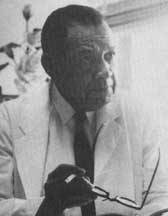Eugene Dibble facts for kids
Quick facts for kids
Eugene H. Dibble Jr.
|
|
|---|---|
 |
|
| Born | August 14, 1893 Camden, South Carolina
|
| Died | June 1, 1968 |
| Medical career | |
| Profession | Medical Director |
| Institutions | Tuskegee Institute |
Eugene Heriot Dibble Jr. (1893–1968) was an American doctor. He was the medical director of the John A. Andrew Memorial Hospital at the Tuskegee Institute in Alabama. Dr. Dibble was an important leader who worked to improve medical care and create more opportunities for African American doctors.
Contents
Early Life and Medical Career
Eugene Heriot Dibble Jr. was born in Camden, South Carolina, on August 14, 1893. He came from a successful African American family. In 1926, he married Helen Taylor. Her father was the first African American to graduate from MIT. They had five children, and one of their sons, Robert, also became a doctor. Dr. Dibble spent most of his adult life in Tuskegee, Alabama. This is where he would later work at the John A. Andrew Memorial Hospital.
Dibble earned his first degree from Atlanta University in 1915. He then received his medical degree from Howard University in 1919. He completed his internship in Washington D.C. at Freedmen's Hospital. Later, he finished his surgery training at the John A. Andrew Memorial Hospital in Tuskegee in 1923.
After his training, he became an assistant medical director. In 1925, he was named the medical director of the John A. Andrew Memorial Hospital. He held this position until 1936. He also worked as the surgeon-in-chief at the U.S. Veterans Administration Hospital in Tuskegee.
In 1936, he returned to the Veterans Administration Hospital. He helped reorganize it as its manager and medical director. While there, he started a special training program for doctors who had already finished medical school.
Dr. Dibble also served in the army during both World Wars. During World War II, he was given the rank of Colonel. This made him the first African American medical officer to reach this high rank. He served from 1944 to 1946.
In 1946, he became the medical director of the John A. Andrew Memorial Hospital for a second time. He stayed there until 1965. He had to retire because his cancer became worse. Dibble also served on the Board of Trustees at Meharry Medical College.
Working for Equality in Medicine
Dr. Dibble is remembered for his work in helping African American doctors gain equal opportunities. He used his influence in the John A. Andrew Clinical Society to achieve this.
The Society supported an annual clinic. This clinic provided medical help to patients who needed it. It also gave African American doctors a chance to work with other specialists. Many of these doctors had not been allowed to work in other hospitals. Dr. John A. Kenney Sr. organized and directed this clinic.
In the late 1940s, the Society began to offer courses in medicine and surgery. These courses were for African American doctors in the South. The goal was to teach them about the newest medical techniques. The Society stopped in 1969. By then, African American doctors were being accepted into other medical groups.
The Society also made big steps in medical education in 1921. It created the first advanced course in medicine and surgery for African Americans in the South. This four-week program was very successful. One hundred twenty-six doctors attended and treated over a thousand patients. The program continued until the late 1940s.
After 1949, the Society focused on providing a larger teaching clinic. They offered programs to keep doctors updated on new medical and surgical methods. Dibble was very important to the Society. He served as its Secretary from 1924 to 1926, and again from 1946 to 1965.
Even after leaving the Society, Dibble kept working to advance medical education for African Americans. In the late 1950s and early 1960s, he traveled with the Baptist World Alliance. He visited doctors around the world. He also provided medical care in developing countries in Africa and Asia. Dibble helped students who wanted to go to medical school in the United States.
He received the 17th Distinguished Service Medal from the National Medical Association. This award was given at their convention in Chicago, Illinois, in 1962.
Even after retiring in 1965, Dr. Dibble loved teaching. He kept an office to work with free clinics. He also taught young doctors and nurses. Dibble was interested in improving health for mothers and children. He worked with maternity clinics to help diagnose problems early.
Death
Eugene H. Dibble Jr. died on June 1, 1968.
Awards and Recognition
Dr. Dibble received many awards and honors during his life. While he was in charge of the Veterans Administration Hospital, President Franklin D. Roosevelt visited in 1936. First Lady Eleanor Roosevelt visited in 1939 and 1941.
In 1956, Dibble became an honorary member of Alpha Omega Alpha. This group recognizes excellence in medicine. The next year, he received an Alumni Award from his old school, Howard University. He also served on the Board of Trustees of Meharry Medical College in Nashville, Tennessee.
Additionally, he was part of the Editorial Board for the Journal of the National Medical Association. His work greatly helped the growth of this journal.

